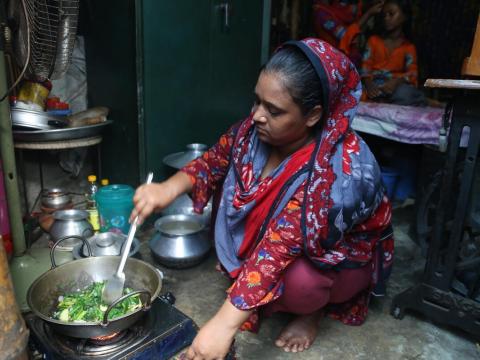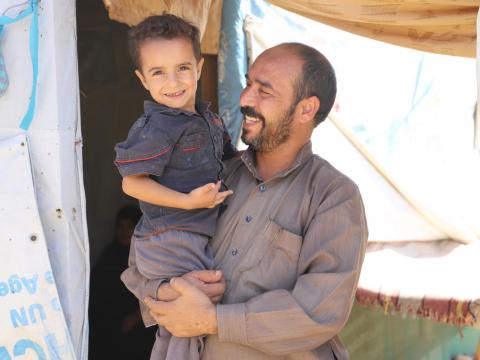Poverty: Robbing girls of their life choices
By Richard Rumsey
“Due to the lockdown, there is an increasing risk of child marriage among the children. Two cases of child marriage have already been registered during this period.”– Ganga Kumari Khadka, Rupatar, Nepal.
Making independent choices and decisions is often seen as a part of everyone’s life. I grew up enjoying these freedoms and it felt fascinating and fulfilling. I had the choice to go to school, to choose a career I loved, and to choose a life partner. Every day presents us with so many choices and we often take them for granted. Sadly, not every child grows up with such privileges, particularly those living in rural poor and fragile contexts where they live on less than $1.90 a day.
The socio-economic fallout from COVID-19 has intensified the daily struggles of vulnerable children, further limiting their life choices. World Vision’s field-level data from 14,000 households in Asia, over 2,400 small business owners in Africa, and more than 360 Venezuelan migrants across Latin America have revealed that desperate parents and caregivers are finding it increasingly difficult to provide their children with healthy nutritious food, or to buy necessities such as medicine and hygiene products. In extreme cases, children are being put in harm’s way – sent to work, to beg or even being married off early – just so they and their families can eat.
Child marriage is most often a choice poor parents are forced to make in order to survive in crises like COVID-19. It is sad and heart-breaking to see girls being robbed of their life choices. The United Nations Family Planning Association (UNFPA) recently forecast an additional 13 million child marriages over the next ten years due to the economic impacts of COVID-19, adding to the 150 million already expected to occur in that time period.
Lessons from Ebola
Ten years ago, the West Africa region faced an Ebola epidemic that killed tens of thousands and left thousands of children without anyone to provide for them. Similarly, damage done by COVID-19 will be irreversible if time runs out to protect both lives and livelihoods. To make ends meet, some families are now resorting to negative coping mechanisms to reduce their household financial burdens. These in turn causes spikes in child abuse, sexual exploitation, forced marriage, adolescent pregnancy, child labour and various other forms of violence against children, especially girls.
Urgent action is thus required before COVID-19 and its impacts reverse decades of progress in the fight against poverty, resulting in an increase in household income inequalities by 2030. Unfortunately, 55% of the global population do not have access to social protection to provide a 'safety net' (additional assistance that helps vulnerable families and individuals experiencing poverty and destitution to cope.)* Even before COVID-19 struck, almost two thirds of all children globally – more than 1.3 billion girls and boys – could not access social protection.
Innovative thinking for major impacts
To bridge the gap, World Vision is being innovative. We are thinking in new ways, we are partnering with more people than ever before, and we are equipping the most vulnerable children and their families with long-lasting solutions. Savings Groups is one tool we use to economically empower women and girls in crises such as COVID-19 in order to give them back their freedom to make life choices.
During the Ebola Outbreak in Sierra Leone, World Vision piloted the formation of a children’s savings group in the Jaima Bongor chiefdom of the Bo District at the request of their parents who were members of the adult savings groups. Members of these new groups are using savings groups as a platform for championing children’s rights and speaking out against teenage pregnancy and child marriage. They are complementing the efforts of other pre-existing and new children’s clubs formed by World Vision in Sierra Leone to champion the rights of the child. Incidences of child marriage have now declined, with Savings for Transformation groups actively involved in World Vision’s campaign It takes a world to end violence against children. Thanks to child protection-combined interventions, children had 52% less risk of exposure to physical or emotional violence at home.
Building back better
As we enter the last decade of action to end child poverty by 2030, I reflect back on the words of the UN Secretary General Antonio Guterres: “[T]he recovery from the COVID-19 crisis must lead to more equal, inclusive and sustainable economies and societies that are stronger and more resilient.” Child sensitive social protection and economic-strengthening interventions, such as Savings for Transformation groups can increase the likelihood of girls attaining an education and minimise the risks of negative coping strategies, such as child marriage, child labour and sexual exploitation.
To read World Vision's publication filled with case studies highlighting how Savings for Transformation intervention can also support efforts to end child marriage click here.
* Examples of social safety nets are non-contributory social pensions, in-kind and food transfers, conditional and unconditional cash transfers, fee waivers, public works, and school feeding programmes.
Richard Rumsey is World Vision's Global Sector Lead for Livelihoods. Follow Richard on Twitter @Rumsey_WVision


